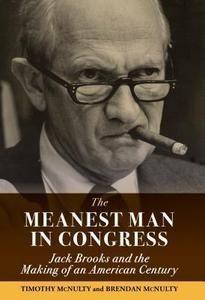
"I voted Democratic and they voted Republican, but we cooperated. We understood each other. And that’s the way legislation is passed, with compromises and agreements between opposing parties. And now, they just don’t get along at all.”
“He’s tough and methodical. He holds people’s feet to the fire. He doesn’t really care if he’s liked.” That was one congressional insider’s view of U.S. Rep. Jack Brooks (D-Beaumont), the powerful Government Operations Committee chair who was a dominant force in the House of Representatives for more than forty years. Another view: “He abuses people. He’d rather make a foe than a friend. He likes to think he’s outspoken, but in fact he’s just rude.”
Texas Monthly magazine, in an article about the Texas congressional delegation in 1977, noted, “People either love Jack Brooks or they hate him. No one is neutral.”
Writers Timothy and Brendan McNulty have written a generally positive, but certainly frank, biography of the late congressman who was defeated in 1994 and died in 2012. Their book might well boast the most provocative title of the year—The Meanest Man in Congress: Jack Brooks and the Making of an American Century (New South Books, $32.95 hardcover).
Brooks was strongly partisan, but he was also pragmatic and able to work with Republicans to get bills passed. His mentors included longtime Speaker of the House Sam Rayburn and President Lyndon Johnson. “To many, both Democrat and Republican,” the authors write, “the irascible Texan was known openly as ‘the meanest man in Congress.’ They meant it as a compliment, but not everyone who used it did.”
A few years before his death, Brooks reflected on how the spirit in Congress has changed, which he blamed on Republican Newt Gingrich, who became Speaker in 1994 after forcing out Texas Democrat Jim Wright. “(Newt) created an atmosphere of animosity between Democrats and Republicans in Congress. When I left, I had a lot of Republican friends. I voted Democratic and they voted Republican, but we cooperated. We understood each other. And that’s the way legislation is passed, with compromises and agreements between opposing parties. And now, they just don’t get along at all.”
The authors trace Brooks’s early life and career from service in the Pacific in World War II to the Texas state legislature and then his election to Congress in 1952. Most of the book, as the title indicates, deals with his forty-two-year congressional career. The stories are told in brief, easy-to-read segments that introduce different issues, developments, and personalities without interrupting the book’s flow.
The authors start with Jack Brooks, at age forty, riding in the fateful presidential motorcade in Dallas on November 22, 1963, eleven cars back of the one carrying President Kennedy. Brooks can be seen later that day in the photo of President Johnson taking the oath of office aboard Air Force One. Brooks would go on to be one of Johnson’s key confidants.
Glenn Dromgoole writes about Texas books and authors. Contact him at g.dromgoole@suddenlink.net.
